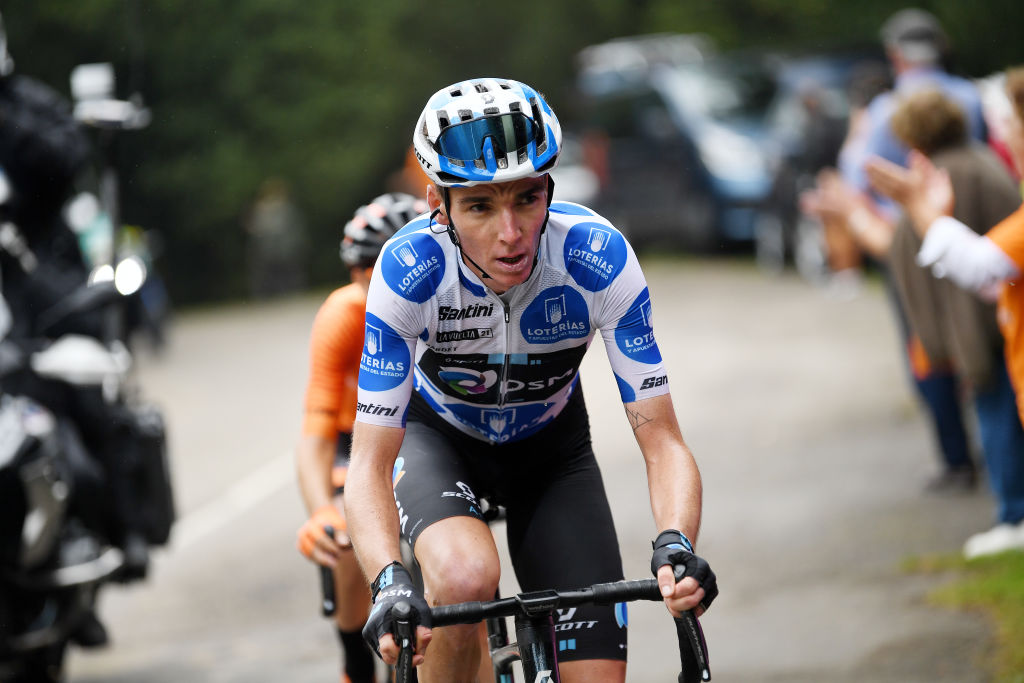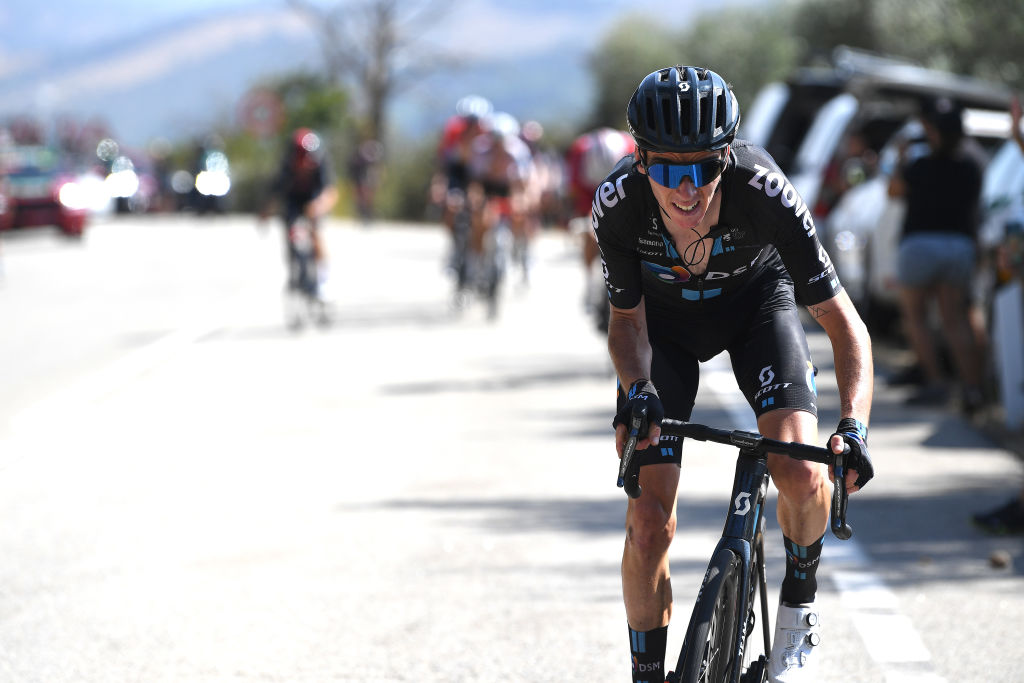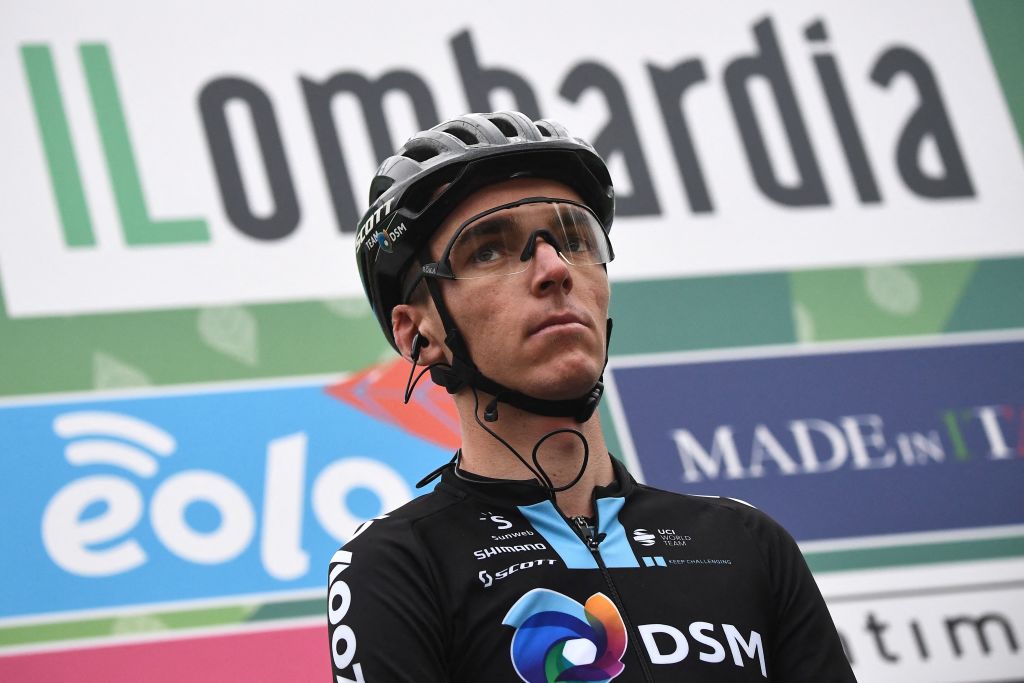Romain Bardet: Moving to DSM was exactly what I needed
Frenchman revitalised this season after leaving 'comfort zone' at AG2R

A year ago, Romain Bardet decided to leave the comfort and security of AG2R and move to Team DSM. It was a transfer that certainly raised a few eyebrows, not least because Bardet had spent the better part of a decade – his entire career to date – at the French squad, but after a lacklustre 2019 the 31-year-old recognised that a change in direction was needed.
Fast forward to the present and it's hard to argue that the specialist climber made the wrong decision. This year Bardet has looked back to his competitive best, with a dogged display at the Giro d'Italia, a stage victory in the Vuelta a España, and a string of lively performances elsewhere
In a year that saw him skip the Tour de France – and racing on home soil altogether – Bardet has rediscovered himself and what's more, become a more complete rider for it.
"The move was exactly what I needed," Bardet told Cyclingnews as we sit down in the lobby of a London hotel on the eve of Rouleur Live.
"I was happy at AG2R but at some point, you need some change. I could have stayed there for another four or five years because it felt like a family to me but at the same time, I needed people around me who could push me a bit harder."
Bardet, as everyone knows, had come through the ranks at Vincent Lavenu's team, turning professional in 2012 and quickly establishing himself as a star. Four successive top 10s at the Tour soon followed, including spots on the podium in 2016 and 2017, but when results appeared to stall it looked as though the Frenchman's shine was beginning to wear off.
Despite winning the King of the Mountains title at the 2019 Tour, and despite looking competitive before crashing out the following year, Bardet had reached somewhat of a crossroads in his career. It was time for a change.
Get The Leadout Newsletter
The latest race content, interviews, features, reviews and expert buying guides, direct to your inbox!
"At home, in France, they weren't super surprised that I ended up moving because they know that I'm a man who likes a challenge, and they realised I could have been comfortable staying in AG2R. I belonged to the team," he said gesturing to his chest, "but this move took me out of my comfort zone, and I had a lot to lose, I must admit.
"But I had to be honest with myself. I was living a fairytale with the Tour de France until 2018. I was moving up but then I couldn't stay on that path until the end of my career because it was becoming obvious that it was no longer working.
"I could go to the Tour and say I'm aiming for a top 10, which is still a big result, but even in 2018 I was sixth and it was my best Tour in some ways and people were still saying 'what is he doing, he's not so good.' So, I felt like I had to do something."
Shared responsibility and working for others at DSM
There were only so many teams that Bardet could have moved to. Any potential suitor had to be in the MPCC – given the rider's staunch and admirable views on anti-doping - and with rival French squads either built around riders like Thibaut Pinot or unable to provide a clear break from the pattern and lifestyle offered by AG2R, a team like DSM began to appeal.
At the same time, the German-registered team had been on the lookout for a new GC rider ever since losing Tom Dumoulin in 2019; they then wisely chose to slow their recruitment policy and not force themselves into a panic signing in order to fill the void. The team wanted to find the rider with the right ethos and mentality before making their move. In many ways, Bardet was the perfect fit.
"I'd known the boss Iwan Spekenbrink since around 2008 and the junior ranks. I was always happy when I saw him at races," Bardet said.
"He's always given me good feelings. I've got a lot of respect for the team that he's built, his strategy, and the way he sees cycling. There are not many teams that I thought I could fit with but they're a team that also really pushes the anti-doping side and for me it was quite obvious that it could be a good team for me."
Not only that, but DSM also provided Bardet with room to breathe. At AG2R, the entire squad – bar a couple of Classics specialists – were almost exclusively geared towards the Frenchman.
That was fine during the vintage summers of 2016 and 2017, when the team were taking the fight to Sky at the Tour, but once Bardet had begun to endure setbacks the team appeared shallow in talent. And when results dried up the first port of call for a disgruntled media was always Bardet.
"I think so," he said when asked if he's a more complete bike rider since his move. "I just enjoyed myself on the bike this year, and especially because I'm not the sole leader anymore. When you ride 21 stages of a Grand Tour with just one goal and the guys are doing everything for you, it can be a bit tough, maybe boring.
"At the Vuelta though this year there were days we were working for the sprints, and then the next days we were hunting breakaways in the mountains. It was really cool and enjoyable and it's the type of cycling that I was looking for.
"At AG2R it was the case that we didn't risk much because it was about the overall and it wasn't an easy situation for my teammates either because they had to look after me. Now at DSM the responsibility is shared more within the team.
"We don't about leaders, we talk about who can finish the work for the team on that specific day."

While Bardet has certainly settled into his new environment at DSM, it's clear that not every rider has flourished there. The team have a reputation for letting riders go mid-way through contracts and for the departing riders to feel undervalued and underappreciated.
Dumoulin, Marcel Kittel and Michael Matthews stand out as the obvious examples of star riders who have found the squad too restrictive and unable to bend to individual needs, but Bardet – himself a freethinking and independent rider – feels that the team ethos and culture is one of support.
"I can only talk about my personal experience and the team has for sure got a very structured plan," he said. "They look at every rider and how they will develop them. Nowadays the young riders, some of them, they can be impatient, and they want to go straight to the top and they miss some key stages in their development.
"They also look around too much at what would be better elsewhere, but they just need to take their time, and make the steps needed because the team are always open to discussion when it comes to making you a better rider. At the end of the day, it's the team that are paying you but if you trust their way of working it's a super nice experience because you get a sense that everyone is involved in your performance. I have a completely opposite view from some other riders.
"If you look at me, the team could have said 'let's not take Bardet, he's already 30 years old and he has his own way of working', but as long as you're open to discussion and see room for improvement then the team will support you. At the same time if you agree to things at the start of your contract and then if things don't go to plan in terms of your physical shape and you're not open to discussion then it can create some friction.
"The team doesn't try and take anyone by surprise and it's the only team I know that makes sure that every single rider has a very clear plan from the very start of the year. On other teams, except for the leaders, you don't really know your race programme for the season."
Bardet also recognises that as one of the elder statesmen on the team he is responsible for helping the younger riders develop.
As well as pitching in at the Vuelta and working for others, the 31-year-old highlights the Giro di Sicilia as a prime example of his new role. Going into the race Bardet was not quite at his best but rather than drag the team to his level he dovetailed his overall ambitions with working for several of the younger riders on the team.
They may not have come away with a win, but several younger teammates were given freedom, while Bardet was still able to deliver a top 10 finish. Overall, the 2021 campaign was one of fulfilment for Bardet.

While the team as a whole struggled for success and saw another raft of young talent – including Michael Storer and Ilan Van Wilder – depart, the Frenchman embraced the challenges and shone in virtually every race he targeted.
The overall result at the Giro was a mild disappointment but there was enough to suggest that given the right parcours Bardet could continue to fight for podium places in the coming years.
"I'm pretty happy with the season that I had, and it was a good year for me. It was also my first complete season since 2018. In 2019 it wasn't a great year and then last year I had my heavy crash in the Tour and there was also Covid.
"From this perspective, 2021 was a good one because I was able to finish in a good way with two Grand Tours. It was also my first year with the team, so it took me a few weeks to get used to it. I was happy to finish the year in good shape and we've done a good job working together.
"At the Giro I think that I could have expected a bit more. I was still happy but with the approach, maybe because the team and I didn't know each other that well, we were maybe a bit too conservative. It meant that I probably wasn't 100 per cent at the Giro but from the second half of the year, August onwards, I was much better on the bike and the results followed.
"I would have signed up for the results I had if you'd offered it to be me at the start of the year. I was able to fight for victories, I was top five at the Giro until the final time trial, and that was without feeling my best, and I was able to score some wins. From where I was in 2019, this has been a good step."
The 2022 steps have yet to be decided but Bardet is keen to a possible return to the Tour de France next year. He skipped the race for the first time in 2021 as he chose to free himself of a schedule he'd raced since 2013, and despite a large quantity of time trialling kilometres in the Tour in comparison to a meagre amount in the Giro, the Frenchman is weighing up his options.
He wants to race two Grand Tours in a single year again but given the dynamic way in which DSM tend to race the Tour – with multiple goals and options – it's not inconceivable to imagine another GC bid at the Giro before Bardet turns stage hunter at the Tour.
"The only thing is that I would like to do two Grand Tours and prepare for them really well," he said. "It worked with the Giro and the Vuelta this year, but the course of the Tour next year is attractive for me. We'll see where I can make a difference there, but we need to be clever because there are stronger riders than me.
"But I think I can compete in the top five and the podium if it goes well but if you have Pogačar and Roglič, and Bernal you need to be clever and then find the Grand Tour that suits you the best.
"I'd like to be back at the Tour but to fit another Grand Tour with that is hard too. I just want to go to the Tour if I can perform. I want to have an impact there and there are different ways of making an impact.
"I'm definitely at the right team for that. I'm sure they are already thinking about it, and I enjoy riding as a team, where everyone has their chance and we all help each other."
Daniel Benson was the Editor in Chief at Cyclingnews.com between 2008 and 2022. Based in the UK, he joined the Cyclingnews team in 2008 as the site's first UK-based Managing Editor. In that time, he reported on over a dozen editions of the Tour de France, several World Championships, the Tour Down Under, Spring Classics, and the London 2012 Olympic Games. With the help of the excellent editorial team, he ran the coverage on Cyclingnews and has interviewed leading figures in the sport including UCI Presidents and Tour de France winners.
